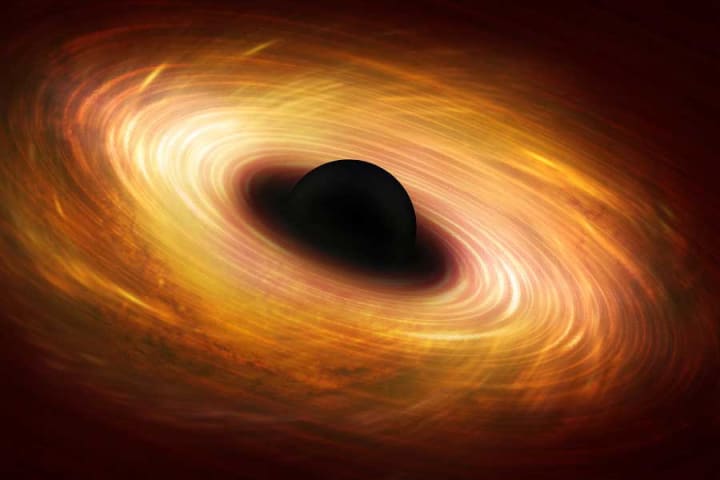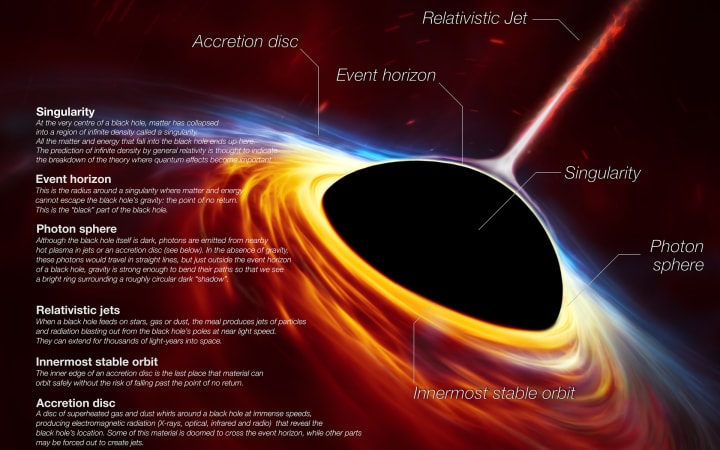
Black holes are one of the most fascinating and mysterious phenomena in the universe. They are regions in space where the gravitational force is so strong that nothing, not even light, can escape. The concept of a black hole was first introduced by physicist John Michell in 1783 and later elaborated on by Albert Einstein's theory of general relativity in 1915. Since then, the study of black holes has become an active area of research in astrophysics and cosmology. In this blog, we will explore the properties, formation, and current understanding of black holes.
What are black holes?

A black hole is a region in space where the gravitational force is so strong that nothing, including light, can escape. The boundary around a black hole from which nothing can escape is known as the event horizon. Once an object crosses the event horizon, it is pulled into the black hole's singularity, a point of infinite density and zero volume. At the singularity, the laws of physics, as we know them, break down, making it impossible to predict what happens beyond the event horizon.

Black holes come in different sizes, and their mass determines their properties. There are three types of black holes:
Stellar black holes:
These are the most common type of black holes, with masses between 1 and 10 times that of the sun. They are formed when a massive star runs out of fuel and undergoes a supernova explosion, causing its core to collapse into a black hole.
Intermediate black holes:
These black holes have masses between 100 and 100,000 times that of the sun. They are believed to be formed through the merging of smaller black holes or the collapse of massive gas clouds.
Supermassive black holes:

These are the largest black holes, with masses ranging from a million to a billion times that of the sun. They are found at the center of most galaxies, including our Milky Way. The exact mechanism of their formation is still unclear, but they are thought to have grown through the merging of smaller black holes and the accretion of gas and dust.
Properties of black holes:
Black holes have several unique properties that make them fascinating to study. Here are a few of them:
Gravity: Black holes have an incredibly strong gravitational force. The closer you get to a black hole, the stronger the gravitational pull becomes. At the event horizon, the gravitational force is so strong that not even light can escape.
Time dilation: The gravitational force of a black hole is so strong that time near a black hole runs slower than time in a region of weaker gravitational force. This effect, known as time dilation, has been observed and confirmed through various experiments.
Accretion disk: When matter, such as gas or dust, falls towards a black hole, it forms an accretion disk around the black hole. As the matter in the disk gets closer to the black hole, it heats up and emits radiation, making the accretion disk visible to telescopes.
Spaghettification: As an object gets closer to a black hole, the gravitational force becomes stronger, stretching the object into a long, thin shape, resembling spaghetti. This effect is known as spaghettification.
Formation of black holes:
Black holes are formed when a massive star runs out of fuel and undergoes a supernova explosion. When a star is in its main sequence, the energy released by nuclear fusion in its core counteracts the gravitational pull, keeping the star stable. However, once the star runs out of fuel, it can no longer produce enough energy to counteract gravity. The core of the star collapses under its own weight, forming a black hole.
The formation of intermediate and supermassive black holes is still unclear






Comments
There are no comments for this story
Be the first to respond and start the conversation.